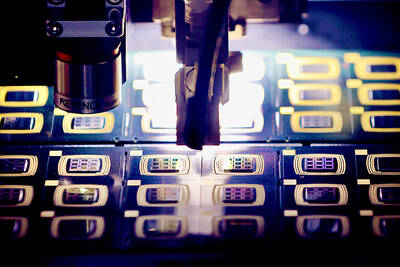Malaysian conglomerate DRB--Hicom Berhad said yesterday it will buy national automaker Proton in a 3 billion ringgit (US$957 million) deal that could help revive Proton’s flagging fortunes.
DRB-Hicom said it would pay 1.29 billion ringgit for government investment arm Khazanah Nasional’s 43 percent stake in Proton. It would then make an offer for all Proton shares it does not own at 5.50 ringgit a share. Analysts said this would bring the total deal to about 3 billion ringgit.
Khazanah said the share sale would help put Proton on a more competitive footing. Analysts said it could help turnaround the struggling automaker, which has failed in recent years to seal tie-ups with foreign automakers, including Volkswagen AG, because of the government’s insistence on maintaining control over a high-profile local company.
DRB-Hicom, controlled by billionaire tycoon Syed Mokhtar al-Bukhary, distributes and assembles vehicles for Volkswagen, Daimler AG’s -Mercedes-Benz and Honda Motor Co. The group is also involved in banking, services and property sectors.
“It’s a fair deal. It bodes well and will open new doors for Proton,” said Ahmad Maghfur, analyst with OSK Research.
Trading of Proton and DRB-Hicom shares was suspended early yesterday. Proton’s share price has nearly doubled in the past two months, closing on Friday at 5.18 ringgit. DRB-Hicom last traded at 2.17 ringgit.
DRB-Hicom pledged in a statement to safeguard Proton as a national car company. At the same time, it said it would seek to grow Proton in the regional market and help make Malaysia a preferred auto manufacturing center.
Once the king of the road, Proton’s fortunes have dwindled with its market share falling to about 30 percent from more than two-thirds just more than five years ago because of greater competition as Malaysia liberalized its auto market.
It has been on the hunt for a foreign partner since Japan’s Mitsubishi Motors Corp, which helped set up Proton in the early 1980s, sold its stake in 2004 because of financial problems. However, previous alliance talks with Volkswagen and General Motors Co collapsed.
Analysts have said Proton, which also owns British sports car maker Lotus, would need to tie-up with a large auto manufacturer to cut costs, gain new technology and penetrate the global market.
Ahmad said DRB-Hicom’s entry would boost Proton with cash injection and new businesses that would add capacity at one of its plants in northern state of Perak that is greatly underutilized.
He said the deal valued Proton at a discount based on its net assets including two manufacturing plants, but was justified given Proton’s poor prospects and annual capital expenditure of about 800 million ringgit. The deal, entirely paid for in cash, will weigh on DRB-Hicom which earlier this year paid 623 million ringgit to buy Khazanah’s stake in national postal company POS Malaysia.
“For DRB-Hicom, it will mean short-term pain for long-term gain,” Ahmad said.

AI SERVER DEMAND: ‘Overall industry demand continues to outpace supply and we are expanding capacity to meet it,’ the company’s chief executive officer said Hon Hai Precision Industry Co (鴻海精密) yesterday reported that net profit last quarter rose 27 percent from the same quarter last year on the back of demand for cloud services and high-performance computing products. Net profit surged to NT$44.36 billion (US$1.48 billion) from NT$35.04 billion a year earlier. On a quarterly basis, net profit grew 5 percent from NT$42.1 billion. Earnings per share expanded to NT$3.19 from NT$2.53 a year earlier and NT$3.03 in the first quarter. However, a sharp appreciation of the New Taiwan dollar since early May has weighed on the company’s performance, Hon Hai chief financial officer David Huang (黃德才)

The Taiwan Automation Intelligence and Robot Show, which is to be held from Wednesday to Saturday at the Taipei Nangang Exhibition Center, would showcase the latest in artificial intelligence (AI)-driven robotics and automation technologies, the organizer said yesterday. The event would highlight applications in smart manufacturing, as well as information and communications technology, the Taiwan Automation Intelligence and Robotics Association said. More than 1,000 companies are to display innovations in semiconductors, electromechanics, industrial automation and intelligent manufacturing, it said in a news release. Visitors can explore automated guided vehicles, 3D machine vision systems and AI-powered applications at the show, along

FORECAST: The greater computing power needed for emerging AI applications has driven higher demand for advanced semiconductors worldwide, TSMC said The government-supported Industrial Technology Research Institute (ITRI) has raised its forecast for this year’s growth in the output value of Taiwan’s semiconductor industry to above 22 percent on strong global demand for artificial intelligence (AI) applications. In its latest IEK Current Quarterly Model report, the institute said the local semiconductor industry would have output of NT$6.5 trillion (US$216.6 billion) this year, up 22.2 percent from a year earlier, an upward revision from a 19.1 percent increase estimate made in May. The strong showing of the local semiconductor industry largely reflected the stronger-than-expected performance of the integrated circuit (IC) manufacturing segment,

NVIDIA FACTOR: Shipments of AI servers powered by GB300 chips would undergo pilot runs this quarter, with small shipments possibly starting next quarter, it said Quanta Computer Inc (廣達), which supplies artificial intelligence (AI) servers powered by Nvidia Corp chips, yesterday said that AI servers are on track to account for 70 percent of its total server revenue this year, thanks to improved yield rates and a better learning curve for Nvidia’s GB300 chip-based servers. AI servers accounted for more than 60 percent of its total server revenue in the first half of this year, Quanta chief financial officer Elton Yang (楊俊烈) told an online conference. The company’s latest production learning curve of the AI servers powered by Nvidia’s GB200 chips has improved after overcoming key component